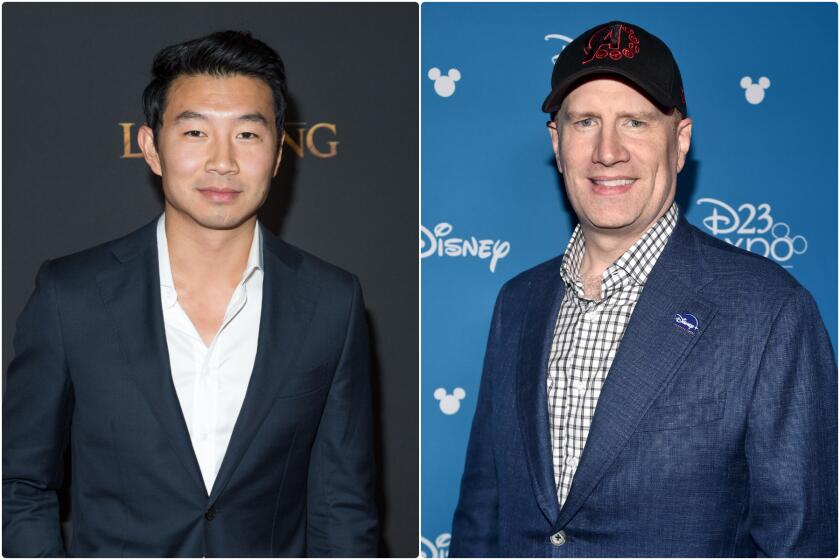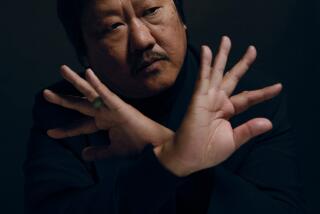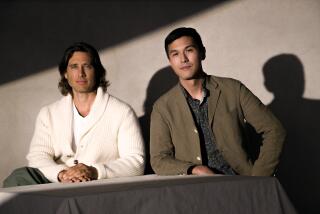Review: The real star of Marvel’s ‘Shang-Chi’ is not who you think it is
- Share via
The Times is committed to reviewing theatrical film releases during the COVID-19 pandemic. Because moviegoing carries risks during this time, we remind readers to follow health and safety guidelines as outlined by the Centers for Disease Control and Prevention and local health officials.
Should I be delighted or depressed that a new Marvel superhero joint will soon be introducing a lot of people to one of the greatest actors and last true movie stars of his generation?
Since “Shang-Chi and the Legend of the Ten Rings” left me in a pretty good mood, I’ll go with tentative delight. The actor in question is the Hong Kong screen titan Tony Leung, who isn’t the movie’s lead — that would be Simu Liu as Shang-Chi — but is every inch its star. Leung is one of those performers who moves through the frame with impossible grace and sometimes doesn’t move at all; if there are other actors who can express more by doing less, who can so magnetize the camera with a flicker of an eyebrow, they aren’t coming to mind.
Not that he has nothing to do here. Leung’s character, Xu Wenwu, is a centuries-old Chinese warlord and the bearer of those legendary 10 rings, Tolkienesque armbands that have made him immortal, invincible and ever lustful for more power. He’s the latest incarnation of the Mandarin, conceived in 1964 by Stan Lee and Don Heck as a mustache-twirling Fu Manchu baddie, though his more recent depictions have skewed away from Asian stereotype. Casting Leung amounts to an ingenious feat of reclamation: This Mandarin is not just a villain reborn but also a prismatic summation of the actor’s remarkable (and until now, Hollywood blockbuster-free) career.
When Wenwu takes over a shadowy criminal empire, you might glimpse echoes of Leung’s most significant villain before this one, from Ang Lee’s wartime drama “Lust, Caution.” When he stumbles onto a secluded village and locks eyes with a skilled warrior, Jiang Li (Fala Chen), their seductive hand-to-hand, heart-to-heart combat feels like a nod to Leung’s gorgeously abstracted martial-arts moves in Zhang Yimou’s “Hero.” And when Wenwu marries Li and then loses her, his obsessive longing casts him in Leung’s most enduring cinematic image: the figure of eternally thwarted desire from Wong Kar-wai masterworks like “Happy Together,” “In the Mood for Love” and “2046.”
I may be overstating the cinephile’s case for this movie, especially since the reckless juxtaposition of words like “Marvel” and “cinema” has been known to start an argument or two. Nevertheless, these allusions and associations feel like the product of some shrewd dramatic calculus by the director Destin Daniel Cretton (“Short Term 12,” “Just Mercy”), who wrote the script with Dave Callaham and Andrew Lanham. Leung’s presence gives the movie an extra-cinematic kick, a winking but resonant connection to an inexhaustible Asian canon of romantic dramas, underworld thrillers and martial-arts epics. It also provides an arresting entry point into a hero’s origin story that tries, with some success, to rise above Marvel business-as-usual.
Marvel boss Kevin Feige has responded to criticism from ‘Shang-Chi’ star Simu Liu after Disney CEO Bob Chapek called the film ‘an experiment.’
Significantly remapping the origins of its comic-book hero (who was created in 1973 by Steve Englehart and Jim Starlin), the movie leaps ahead several years to catch up with Wenwu and Li’s grown son, Shang-Chi (Liu). Despite his extraordinary parentage, he’s living a fairly ordinary life in San Francisco. Mom is dead and Dad is nowhere to be seen. Shang-Chi works as a valet driver along with his friend and fellow slacker, Katy (Awkwafina, in typically strong sidekick form), whose skills behind the wheel come in handy when a bunch of thugs ambush them one day on a bus. It’s a shock to Katy and likely some in the audience when her goofy best bud (whom she’s always known as just “Shaun”) unleashes a dazzling panoply of kung fu moves — abilities that were drilled into him by the father who abandoned him, but who now appears to be calling him home.
There are times (not enough, frankly) when “Shang-Chi and the Legend of the Ten Rings” suggests an unusually demented comedy of cross-generational Asian conflict, in which the usual clashing sensibilities — East and West, traditional and modern — play out on a world-threatening supernatural stage. (The early nods to “The Joy Luck Club,” from the San Francisco setting to a brief cameo by the great Tsai Chin, are surely no accident.) In this interpretation, Wenwu looms as the big bad tiger dad to Shang-Chi, the gifted underachiever who’s gone West and gone soft. Caught somewhere in between is Xialing (Meng’er Zhang), Shang-Chi’s estranged sister, whom he tracks down at an underground fight club in Macao.
That club (where Ronny Chieng makes an amusing bookie) becomes the site of a most unhappy family reunion, though not before a scene of vertiginous nighttime acrobatics on some rickety outdoor scaffolding. The action sequences here are a cut above the norm for this franchise, and I mean that as no huge compliment, given how indifferently staged, drably lighted and wholly unexciting most Marvel action sequences tend to be. It’s gratifying if unsurprising that more care has been taken with “Shang-Chi and the Legend of the Ten Rings,” given its roots in classic action cinema. The fight scenes, often backed by the percussion of Joel P. West’s versatile score, draw on myriad influences, from the artful kineticism of Tsui Hark to the slapstick fisticuffs of Jackie Chan and Stephen Chow. The movie may not live up to those ambitions — the action is still too aesthetically anonymous, too CG-polished — but it’s nice that it has them to begin with.
It’s nicer still when Leung’s Wenwu returns, rocking a mandarin-collared white suit (Kym Barrett’s costumes are a highlight) and kicking this tale of an epically dysfunctional family into high gear. Speaking in a higher-than-usual voice that rumbles with torment, rage and pop gravitas, Leung sets the vengeful tone for a drama that’s Oedipal in its overtones and elliptical in its structure. Wenwu’s reemergence triggers several flashbacks to his wife’s untimely death and the grim fallout on their kids: We see young Shang-Chi being cruelly warped into a killing machine, while young Xialing is just as cruelly ignored. That doesn’t stop her from becoming a skilled, self-taught martial artist in her own right, intent on rebuking — and eclipsing — her father’s patriarchal disdain.
Released Monday, the first trailer for “Shang-Chi and the Legend of the Ten Rings” gives fans a sneak peek at Marvel’s first superhero of Asian descent.
The movie’s own blind spots aren’t as easy to overcome. Despite the occasional “Captain Marvel” and “Black Widow” that comes down the pike, the Marvel movies tend to practice a feminism that’s both self-congratulatory and weirdly hesitant — a failure that feels all the more glaring for the filmmakers’ obvious attempts to address it. In drawing attention to Xialing’s personal history of neglect, “Shang-Chi and the Legend of the Ten Rings” insistently telegraphs its awareness of its own shortcomings. Short of squeezing her name into its already overextended title, the movie can only do so much to grant brother and sister the equal weight they deserve.
Xialing, frankly, may well deserve the lion’s share. Shang-Chi is the designated hero, but as inhabited by Liu, who’s better in motion than at rest — and at his best opposite Awkwafina, with whom he works up a sharp, funny rapport — his emotional arc comes only fitfully into focus. It makes sense that he would feel guarded about his past, but Liu seldom finds the necessary tension in that reserve. Shang-Chi has demons galore, having been abused, brainwashed and betrayed by the monomaniacal Wenwu, but those demons are more often articulated than fully expressed. This Shang-Chi seems to have inherited much of his father’s martial-arts prowess but not nearly enough of his charisma.
That’s neither a fatal flaw nor a surprising one, and not just because few actors here or anywhere can hold the screen against Leung. Reductive as the comparison may be, it’s hard to watch “Shang-Chi and the Legend of the Ten Rings” and not flash back on the superior “Black Panther” — not just because both movies represent a departure from the mostly white history of Hollywood superheroics, but also because they’re bound by a dramatic structure with its own built-in strengths and limitations. Here, as in that earlier picture, an appealing, somewhat recessive hero is surrounded by many whirling, diverting parts — parts that Cretton and his crew (including the director of photography William Pope and the editors Nat Sanders, Elísabet Ronaldsdóttir and Harry Yoon) have smoothly marshaled into a self-contained world.
That world must, of course, fit snugly inside a larger one, and from time to time you’re reminded that you’re watching not just a movie but an installment, a feature-length cog in the relentless Marvel machine. Doctor Strange’s monkish sidekick Wong (Benedict Wong) shows up, as does another company player whose identity I’ll keep under wraps even if the internet hasn’t. Pockets of Sue Chan’s production design are strewn with references to the five-year “blip” from the last two “Avengers” movies.
But “Shang-Chi and the Legend of the Ten Rings” is most enjoyable when it shakes off the tedious franchise imperatives and forges its own path. The movie’s late-breaking highlights include Michelle Yeoh’s performance as Ying Nan, a mentor figure to Shang-Chi and Xialing who dispenses pearls of wisdom with customary poise and offers a warm counterweight to Leung’s brooding chill. Ying Nan pops up in Ta Lo, a secluded Chinese village that occasions some of the movie’s more striking visuals (including a dynamic joyride through a leafy labyrinth) and paves the way to the movie’s exciting mountainside climax.
Although tailored to the usual Marvel specifications — apocalyptic stakes, bloodless casualties — this endgame also has a distinctly personal undercurrent that seems to transcend the parameters of this particular story. Without divulging too much, this isn’t the first time a Leung character has stood before a mighty wall of stone, pondering depths of love and loss that only he can see or hear — a quick but not-insignificant reference in a movie whose porous sense of cinema history is the richest thing about it. “Shang-Chi and the Legend of the Ten Rings” may be far from perfect, but it knows that sometimes it takes a god to play one.
‘Shang-Chi and the Legend of the Ten Rings’
In English and Mandarin with English subtitles
Rated: PG-13, for sequences of violence and action, and language
Running time: 2 hours, 11 minutes
Playing: Opens Sept. 3 in general release
More to Read
Only good movies
Get the Indie Focus newsletter, Mark Olsen's weekly guide to the world of cinema.
You may occasionally receive promotional content from the Los Angeles Times.












